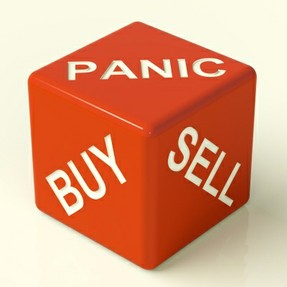In my previous article Conservative Or Aggressive Investment – How Should Retired Investors Proceed? I discussed some of the reasons why investors should be able to invest peacefully, without having to endure the emotional stress that is so often associated with financial markets. I made my point by presenting the concept of the Livability Factor that takes into consideration not only the financial aspects of investment but emotional aspects as well.

The Investment Climate for 2012 – What Every Retired Investor Needs To Know
Successful Retirement Investment Planning Tips for 2012
 |
We want to see retired investors investing their retirement income in a way that will ensure that they will survive the hard times and be around to enjoy the good times. As a portfolio manager with many years of private wealth management experience, I have come to the conclusion that the reason many investors fall in to the nerve wrecking waiting game is because they have bought into the ‘fear of missing the big run’ investment lie presented to them by their Wall Street System advisor. But as I suggested before, this does have to be so!
Fear Of Missing The Big Run – Retired Investors, Don’t be Fooled!
Why do I say that investors have bought in this big lie? Allow me to explain:
A good example for instance is by looking at the return of the the S&P 500 for the 25 year period between 1985 – 2010; in analyzing this information, you will find that, for investors who remained invested during this entire period (buy, hold and suffer), their average annual return would have been 7.93%.
 Unfortunately, the industry would like to have investors believe that missing the best days would destroy their return. Taking the example above, the industry is suggesting that, if an investor had missed the best 40 days of each year, he or she would have lost money. Secondly, that their average annual return would have been something like -1 or 2%.
Unfortunately, the industry would like to have investors believe that missing the best days would destroy their return. Taking the example above, the industry is suggesting that, if an investor had missed the best 40 days of each year, he or she would have lost money. Secondly, that their average annual return would have been something like -1 or 2%.
I however believe that, if during this 25 year period, an investor had been fortunate enough to miss the 40 worst days of each year, they would have made much more than the S&P 500 return. By MISSING the 40 worst days, your average annual return as an investor would have jumped to something like 19% a year. In fact, your return would have jumped from an average of 7.93% a year to around 19% a year just by missing the 40 WORST days of the market each year. Even more, missing BOTH the best and worst days would have resulted in you doing better than the S&P 500 index, given that your return would have been close to 10% a year.
Retired Investors – How To Remain At The Top Of Your Game
After reviewing the 2011 financial year, I have concluded that investors will need some strategic financial planning guidelines in order to live through the 2012 financial seasons, and I make a recap of them:
- First, to be a successful investor – with the type of investments that will meet your goal over the next 5-10 years, it is important to be able to stay in the investing game. Unless you have way more money than you need, investing in CDs alone will not allow you to maintain your lifestyle.
- Second, the two main reasons that an investor gives up on an investment is because they are unable to stomach prolonged plunges in their account value and the wild gyrations up and down during sideways markets. It’s has never been because they are not ‘strong’ enough, the problem is that the account hasn’t been managed within their comfort zone.
- The WSS wants investors to believe that you have to remain invested all the time to reap long-term rewards. This is not true. Studies show that it is more important to miss the worst days of each year than to stay in for the best days. In other words, we don’t have to stay fully invested, and besides, our chances for a higher return actually improve even if we miss the best days each year.
- As a portfolio manager, it is important for me to manage the account of my clients by keeping in mind what their comfort zone is. In order to achieve this, I need to work with my client to identify what is his or her comfort zone. I particularly find that being able to constantly review with my client what their comfort zone is can be very important, as the level of comfort changes with time. The earlier I am aware of this change, the faster I can monitor the client’s account to ensure that they are constantly maintained within levels which the clients are comfortable with.
- I also know that it matters to my clients how their money is managed and monitored in the short-term. How a client’s account is allocated and how these allocations are adjusted will determine whether or not the account stays within the client’s comfort zone. My philosophy is that, I would rather err by being too conservative rather than too aggressive. If it is more important to miss the worst days than be invested for the best days, then this results in the greater risk of exposing the account to big losses. By having a greater preference to conservatively positioning the portfolio, I am able to better manage that risk.
I aware though that the conclusions I made above are rarely offered by financial planners to their clients. The better I understand what makes you uncomfortable and when you are becoming uncomfortable, the better able I will be to help you achieve your goals.
We all have constraints. Successful investing is about recognizing those constraints and incorporating them into the overall positioning and management of the account. This should however not take away from the importance which private wealth managers need to attach to understanding their clients comfort zone.
I explain the reasons for this and more in my next and last article for this series - 2012 Investment Forecast – A Great Year For Retired Wealth Investors
About The Author
Jeff Voudrie is a Certified Financial Planner and nationally recognized financial advisor. Jeff has been in the financial industry for twenty-five years, and has been interviewed by The Wall Street Journal, CBS Marketwatch, Kiplinger's, The London Financial Times, The Christian Science Monitor, CFO.com and Financial Planning Magazine. For more information on Jeff, please visit: www.jeffvoudrie.com or www.commonsenseadvisors.com
You might also like
Make Invoice Home your home for invoicingThe ideal place for independent businesses to go to for sending out invoices ...
How To Negotiate Almost AnythingDon't pay top dollar for a product or service until you try negotiating. Try ...



 2012 Investment Forecast – A Great Year For Retired Wealth Investorson 03/23/2012
2012 Investment Forecast – A Great Year For Retired Wealth Investorson 03/23/2012
 Conservative Or Aggressive Investment – How Should Retired Investors Proceed?on 03/23/2012
Conservative Or Aggressive Investment – How Should Retired Investors Proceed?on 03/23/2012
 The Livability Factor – A Healthier Alternative For The Retired Wealth Investoron 03/20/2012
The Livability Factor – A Healthier Alternative For The Retired Wealth Investoron 03/20/2012
 2012 - A Solemn Year For Retired Investors? ’Don’t Think Soon 03/20/2012
2012 - A Solemn Year For Retired Investors? ’Don’t Think Soon 03/20/2012


Comments